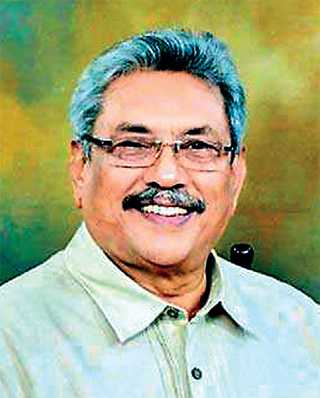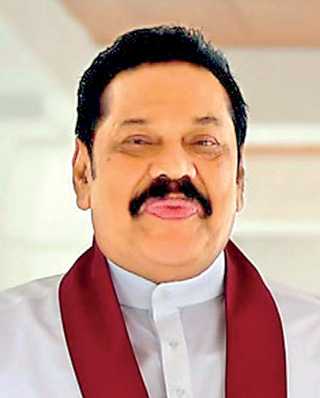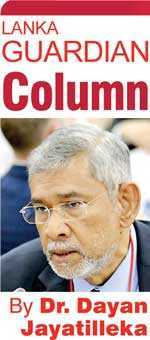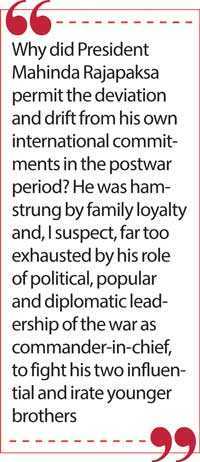Monday Feb 16, 2026
Monday Feb 16, 2026
Monday, 8 March 2021 00:00 - - {{hitsCtrl.values.hits}}

President Gotabaya Rajapaksa

Former President Mahinda Rajapaksa

Slain Editor Lasantha Wickrematunge

Foreign Secretary Admiral Jayanath Colombage
 In the riveting docudrama ‘The Dissident’ about the murder of Washington Post columnist Jamal Khashoggi, aged 60 (described as ‘reformist-insider’ turned ‘dissident’), there is a scene in which his widowed fiancée, Turkish scientist Hatice Cengiz, is seated in the hall of the UN Human Rights Council in Geneva with the iconic ceiling artwork donated by Spain, listening at a session and proceeding to address it. I felt a sense of pride in having served at the UNHRC, also as a Vice-President, when I watched that sequence.
In the riveting docudrama ‘The Dissident’ about the murder of Washington Post columnist Jamal Khashoggi, aged 60 (described as ‘reformist-insider’ turned ‘dissident’), there is a scene in which his widowed fiancée, Turkish scientist Hatice Cengiz, is seated in the hall of the UN Human Rights Council in Geneva with the iconic ceiling artwork donated by Spain, listening at a session and proceeding to address it. I felt a sense of pride in having served at the UNHRC, also as a Vice-President, when I watched that sequence.
It is through the UNHRC that the UN Special Rapporteur on Extrajudicial Executions, Dr. Agnes Callamard became the Special Investigator into the murder and explained the evidence to the world.
By the victims of human rights abuses, the UNHRC is seen as the world’s collective human rights conscience and the world’s parliament of human rights, and the UN Human Rights High Commissioner, not as a mere high official, but a tribune of the people whose human rights have been threatened or transgressed.
Collective prevention
The UN Secretary-General has said that that UN will mobilise international actors in an effort to ensure that the military coup in Myanmar “shall not stand”. How would he regard the situation of a country which is already midway to Myanmar, which if you add the proposed new Constitution to the Human Rights High Commissioner’s critique of militarisation, is pretty much where Sri Lanka is? Is the international community most inclusively represented by the United Nations, and its dedicated body for human rights, the UNHRC, likely to take action in the form of sounding the alarm, alerting, educating and mobilising global opinion and the international system, so as to contain the drive to despotism?
Alan Keenan is one of the most astute students of the continuing Sri Lankan crisis. I have debated him (cordially) in places and at times as diverse as the ICES Colombo around 1999-2001 and the IFRI, Paris 2011-2012. He has been for many years now, with the International Crisis Group (ICG). The ICG’s boss until a few weeks ago was Robert Malley, now President Biden’s special envoy in charge of the Iran file which includes negotiations on the possible renewal of nuclear deal which President Trump tore up.
In a recent, well-argued ICG paper, Alan Keenan provides the reasons which, when the dots are connected, corroborate my misgivings that Sri Lanka is midway to Myanmar. Keenan writes that:
“…Sri Lanka is now firmly in the hands of its most nationalist and militarist elements. Their commitment to authoritarian, militarised governance and to the political and cultural supremacy of the Sinhala and Buddhist majority pose a growing threat to Sri Lanka’s battered democratic institutions and to its political stability…The president has also given unprecedented policymaking powers to serving and retired military officers, many of whom UN or other non-governmental investigations have implicated in human rights and humanitarian law violations…On 9 January, President Rajapaksa publicly threatened to treat an opposition parliamentarian like he did the Tamil Tigers leader, Velupillai Prabhakaran, whom he boasted to have “killed like a dog”…With the military playing a direct role in district administration, and nationalist Buddhist practices given official state sanction, Tamils, like Muslims, are increasingly worried about further land seizures for military bases or Buddhist shrines and temples…” (Sri Lanka: Prevention Should Be at Heart of New Human Rights Council Resolution | Crisis Group – https://www.crisisgroup.org/asia/south-asia/sri-lanka/sri-lanka-prevention-should-be-heart-new-human-rights-council-resolution)
 Ahimsa’s article, Lasantha’s ghost
Ahimsa’s article, Lasantha’s ghost
As an editor, Lasantha Wickrematunge would have been proud that his daughter had an Op-Ed article published in one of the world’s two most prestigious and influential newspapers, the Washington Post (the other being the New York Times). As someone whose father had a rare full-page piece in the Washington Post, I salute her achievement. The Post is mandatory reading in the White House and Ahimsa’s article would have caught the eye of top members of the administration and resonated especially among those who were parents. The powerful US House Foreign Relations Committee had re-tweeted the piece.
Going by a report in the Daily Mirror, the Government has responded roughly to Ahimsa’s article:
“Foreign Secretary Admiral Jayanath Colombage firmly rebuked a widely distributed article by Ahimsa Wickrematunge published yesterday in the Washington Post criticising President Gotabaya Rajapaksa and the present Government for denying justice for the murder of her father, founding editor of The Sunday Leader Lasantha Wickrematunge, who was killed in 2009.”
While stating that he had not personally read the article, the Foreign Secretary said that it was an attempt to “destroy Sri Lanka and see its downfall” by rallying the international community to impose travel restrictions and embargoes on Sri Lankan leaders. “Not only her, many are there to try and destroy Sri Lanka,” Colombage continued.” (Daily Mirror – Govt. slams Ahimsa for trying to ‘destroy’ Sri Lanka – http://www.dailymirror.lk/breaking_news/Govt-slams-Ahimsa-for-trying-to-destroy-Sri-Lanka/108-207053)
Having failed to see justice done by her father for 12 years, what better course of action by the daughter of a slain editor than to publish an article and what better moment for a daughter to revive her father’s memory that on the eve of a UNHRC vote? Furthermore, it beggars belief that an article by a 29-year-old could “destroy” Sri Lanka. Those who decry that article should hold themselves responsible, because as already pointed out days after Lasantha’s killing:
“…If there are those who think that people should be killed because of what they express and then go onto to actually order the killing; if our institutions cannot apprehend and punish the killers and therefore they enjoy impunity; if there are those who actually justify the murder of an unarmed man however bad or wrong his views; then something very nasty and dangerous is happening to us. What kind of society is emerging? What would we have lost while engaging in the necessary war against the separatist terrorist enemy?” (Dayan Jayatilleka, THE MURDER OF AN EDITOR – Groundviews, 17 January 2009 – https://groundviews.org/2009/01/17/the-murder-of-an-editor/)
The Government’s aggressive response is not going to make the right impression at the UNHRC or on world opinion. When Lasantha was killed, I certainly had no way of knowing in January 2009 that we would be facing a UNHRC special session and a vote in late May that year. Lasantha was a friend, and moreover he was a journalist and an editor, while my late father was the founder-president of the Editors’ Guild of which Lasantha was a founding member. My article which appeared in The Island and Groundviews on 17 January 2009 said, among other things, the following:
“I do not know who killed him, but I must disclose that I do know something about his killers and those who ordered the killing. They were cowardly barbarians. They were cowards because they killed an unarmed man, and anyone who intentionally kills an unarmed man or woman is a coward. They were barbarians because they expressed their disagreement with what Lasantha wrote and did, not by opposing his ideas with the same weapons of words, but by butchering him. That conduct places one outside the borders of humanity and universal values of civilisation. There are those who may think that these are values that cannot be upheld in times of war, especially a war against terrorism. That is nonsense.” (THE MURDER OF AN EDITOR – Groundviews, 17 January 2009 – https://groundviews.org/2009/01/17/the-murder-of-an-editor/)
Though written in my personal capacity, there could be no doubt about the stand that the official representative of Sri Lanka to the UN Geneva took about that murder and other such murders, while a long-standing advocate and staunch defender of the war and the need to liquidate the LTTE as a fighting machine. Holding the moral high-ground, establishing an ethical firewall between war-fighting and war-crimes, and being seen to do so, always helps any state within the context of the United Nations and in international relations as a whole.
Tragic trajectory
Re-reading my January 2009 article on the murder of Lasantha together with the UN Human Rights High Commissioner’s Report presented recently (2021), my premonitory misgivings of Sri Lanka’s postwar trajectory can be retrospectively revaluated.
“While we support our military and the military effort, Sri Lanka must not enthrone militarism. Unfortunately, those who oppose militarism do not support the military and the military effort, while those who support the military and the military effort do not oppose militarism…The outcome of the defeat of the Tigers must be a restored democracy and an open society, devoid of the mistakes and inequities that constituted the causes of our conflict — not a straitjacketed social order which suffocates diversity and its expression and enthrones the values of intolerance in the name of patriotism, the nation and ‘cultural correctness’. After the gun-smoke of war wafts away in the tropical wind, we must not look around and glimpse the outlines of a dominant social bloc which has as its ideology a theocratic militarism and regards the popularly elected civilian political leadership as a screen of some sort. Could it be that the murder of Lasantha is part of an effort to dictate the terms of the post war order, social political and ideological; an extra-constitutional attempt to unilaterally re-draw the lines of permissible dissent?” (Jayatilleka, THE MURDER OF AN EDITOR – Groundviews, 17 January 2009 – https://groundviews.org/2009/01/17/the-murder-of-an-editor/)
Of my published writing dating back at least to 1978, the passage above is one of those I am proudest of having authored and saddest about having had to author, and being proven right.
The first intellect to discern this dangerous trend and project the outcome as far back as 1984, must be acknowledged. In May 1984, the United Nations University (UNU) South Asian Perspectives Project in association with the Lanka Guardian magazine, held a symposium on ‘Ethnic Relations and Nation Building in Sri Lanka,’ attended by 25 religious leaders, scholars, journalists and trade unionists, among them Professors Shelton Kodikara, Karthigesu Sivathamby and Dr. Newton Gunasinghe. (I was one of those 25 participant-signatories.) The co-chair of the seminar, Lanka Guardian founder-editor Mervyn de Silva (my father) authored Part IV of the four-part report on ‘The International Context’.
Mervyn’s report on the ‘International Context’ forewarned that: “In the event of a total failure to achieve a negotiated political settlement…the cumulative effects of these already discernible processes will see the Sri Lankan state acquire some of the structural characteristics of the State of National Security, a familiar Latin American phenomenon”. (For full report see: ‘The Challenge in South Asia: Development, Democracy and Regional Cooperation’ eds. Ponna Wignaraja and Akmal Hussain, United Nations University Press/SAGE publications, 1989).
This became Sri Lanka’s trajectory and outcome. It didn’t have to be, even after the war had to be fought to a finish. Having been attempted repeatedly in intermissions during the long war, including with India’s help, the political settlement could have been negotiated after the war. That was the commitment.
 Cause of the current challenge
Cause of the current challenge
The joint statements that GoSL and President Mahinda Rajapaksa entered into with the Government of India and the Secretary-General of the United Nations on 21 and 23 May 2009, virtually the morning after the war had been won, and the text of the UNHRC resolution of 27 May 2009, which acknowledged and contained the full text of those joint statements, constituted the roadmap to a democratic, devolved, postwar Sri Lankan state.
Mahinda Rajapaksa didn’t have to agree to those two joint statements because he had won the war, having faced down David Miliband and Bernard Kouchner’s efforts at diplomatic pressure, but he rightly made those transparent commitments because he knew that mounting international concerns had to be assuaged, wartime promises to India had to be kept and wounds had to be healed through a political settlement. His was a statesmanlike gesture. Sri Lanka’s contemporary international problems are not sourced in those joint statements and the winning UNHRC resolution, respectively of 21, 23 and 27 May 2009, but quite precisely in the delay and later the failure to fulfil the content and commitments of those texts; follow that roadmap.
Interviewed extensively on Al Jazeera just the other day, criticism of the 13th amendment was voiced together with a needless, ill-timed oversimplification of India’s role “in the early 1980s” by Secretary/MFA Admiral Colombage. Under President Gotabaya Rajapaksa the roadmap has been torn up and the journey is in a backward direction. Thus, the sharp international reaction to “backsliding” and Lanka’s “dangerous trajectory”.
Why did President Mahinda Rajapaksa permit the deviation and drift from his own international commitments in the postwar period? He was hamstrung by family loyalty and, I suspect, far too exhausted by his role of political, popular and diplomatic leadership of the war as commander-in-chief, to fight his two influential and irate younger brothers. Basil Rajapaksa stalled elections to the Northern PC or even the appointment of an interim administration because he was and is a political monopolist who wished to extend the ruling party’s political domination, submerging the existing Tamil parties (including the EPDP). Gotabaya Rajapaksa, who was and is a military monopolist, reflected the views of the most hawkish element of the Defence establishment and the armed forces whose view remains zero accountability, zero-autonomy.
Gota is no Chavez
President Gotabaya Rajapaksa, his ex-military colleagues and the serving military brass must rid themselves of the idea that the international media is out to get him/them because of anti-military prejudice. That is demonstrably untrue.
Stephen Sackur’s long (two-part if I recall) interview in 2010 with Gotabaya Rajapaksa, which became testier and more hostile by the minute, was followed by a Hard Talk interview by him the very next weekend with another personality from the global South. That personality was also a voluble, controversial military man, but controversial for different reasons. He was far more pronounced an anti-imperialist than Gotabaya Rajapaksa ever was or will be. He was the elected President of his country.
The interview with Gotabaya Rajapaksa ended with the Secretary/Defence hot under the collar and Stephen Sackur utterly frosty. By contrast, the interview that followed the next weekend on the BBC’s Hard Talk ended with Stephen Sackur moving forward in his chair and half-rising from it, reaching across the table and shaking hands warmly with the ex-military, patriotic, militant, outspoken president of a Third World country. That was Hugo Chavez of Venezuela. Chavez had communicated something which the hard-nosed, elitist BBC celebrity could be softened by and even relate to. GR, not so much.
Then and now
In keeping with the SLFP’s identification with the Sinhala peasantry, heightened by the symbolism of the pro-peasant maroon shawl (‘saatakaya’) of his father and uncle, President Mahinda Rajapaksa chose the shut-off by the LTTE of water to the farmers at Mavilaaru as the casus belli to launch the war of liberation against the secessionist-terrorist Tigers.
President Gotabaya Rajapaksa de-regulated the forest reserves, facilitating a corporate landgrab, an ‘enclosure movement’ by electric fencing, deforestation, diversion of the elephant trails, and stoppage of the water-flow, which have deprived the (Sinhala-Buddhist) farmers of water for cultivation of their crops and for their livestock to drink. Despair abounds.